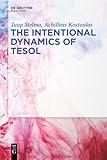The Intentional Dynamics of TESOL / Juup Stelma, Achilleas Kostoulas.
Material type: TextPublisher: Berlin ; Boston : De Gruyter Mouton, [2021]Copyright date: ©2021Description: 1 online resource (XIII, 270 p.)Content type:
TextPublisher: Berlin ; Boston : De Gruyter Mouton, [2021]Copyright date: ©2021Description: 1 online resource (XIII, 270 p.)Content type: - 9781501517204
- 9781501511066
- 9781501511165
- 428.0071 23
- PE1128.A2 .S745 2021
- online - DeGruyter
- Issued also in print.
| Item type | Current library | Call number | URL | Status | Notes | Barcode | |
|---|---|---|---|---|---|---|---|
 eBook
eBook
|
Biblioteca "Angelicum" Pont. Univ. S.Tommaso d'Aquino Nuvola online | online - DeGruyter (Browse shelf(Opens below)) | Online access | Not for loan (Accesso limitato) | Accesso per gli utenti autorizzati / Access for authorized users | (dgr)9781501511165 |
Frontmatter -- Contents -- List of Figures -- List of Tables -- List of Abbreviations -- Chapter 1. Introduction -- Part A: Developing the model of intentional dynamics -- Chapter 2. Everything is connected: Ecological theory -- Chapter 3. Everything is dynamic: Complex dynamic systems theory -- Chapter 4. Meaning is primary: Intentionality -- Chapter 5. A model of the intentional dynamics of TESOL -- Part B: Exemplifying the model of intentional dynamics -- Chapter 6. Individual intentionality: Language teachers becoming researchers -- Chapter 7. Shared intentionality: Task-based activity in a young learner classroom -- Chapter 8. Derived intentionality: A Greek private language school -- Chapter 9. Sociocultural aspects of TESOL as an intentional ecology -- Part C: Extending the model of intentional dynamics -- Chapter 10. Language learning as intentional becoming -- Chapter 11. A critical-intentional perspective for TESOL -- Chapter 12. Researching intentional dynamics in TESOL -- Chapter 13. Intentional dynamics and the future of TESOL -- References -- Index
restricted access online access with authorization star
http://purl.org/coar/access_right/c_16ec
This book presents intentional dynamics, which is a new perspective on TESOL contexts, activity and outcomes.The key innovation is a synthesis of complex systems and ecological theories, as well as the concept of intentionality from the philosophy of mind, to understand the psychological and social processes of TESOL. One aspect of intentional dynamics is the ‘ordinary’ intentions of individuals to perform particular actions, and of organisations to achieve planned outcomes. Another aspect is philosophically defined psychological and social forms of intentionality. Psychological intentionality is understood as what language learners' and teachers' (and other stakeholders') beliefs and emotions are ‘about’ or ‘directed at’. Social intentionality is the ‘aboutness’ expressed by TESOL materials, curricula and policies. The book explores how intentional dynamics both emerge from and give shape to TESOL activity, and outlines what are the practical implications of intentional dynamics for TESOL learners, teachers, researchers, managers and policy-makers.
Issued also in print.
Mode of access: Internet via World Wide Web.
In English.
Description based on online resource; title from PDF title page (publisher's Web site, viewed 25. Jun 2024)


